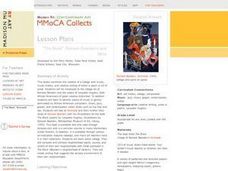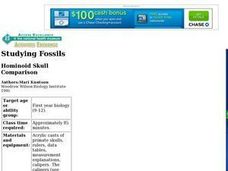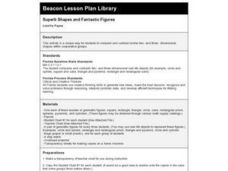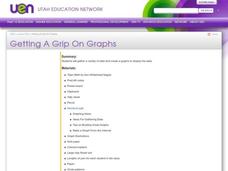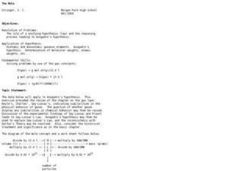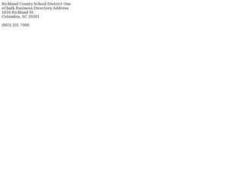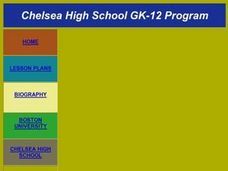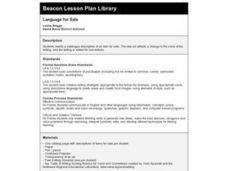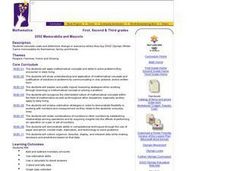Curated OER
"The Block": Romare Bearden's and Mine
Students study Bearden's style of collage and create their own collage that reflects their neighborhood. They are read "The Block" and poems about neighborhoods and write one about theirs.
Curated OER
Hypothesize This!
Students role play scientists to prove a hypotheses. They determine whether or not walruses stay warmer in water or in air. Students also determine in which environment they lose more body heat.
Curated OER
Hominoid Skull Comparison
Students are provided with evidence used to support evolutionary theory. They are introduced to classification by using primates as an example. Students read article related to Hominoid Skull Comparison and write a summary about the...
Curated OER
How Hot is Too Hot?
Fifth graders use the scientific method to conduct experiments on the temperature effects on organisms. In this temperature effects on organisms lesson plan, 5th graders observe and record the hatching or the developing of organisms into...
Curated OER
Superb Shapes and Fantastic Figures
Students compare and contrast similar two and three dimensional shapes within cooperative groups.
Curated OER
Getting A Grip On Graphs
Fourth graders gather variety of data and create a graphs to display the data.
Curated OER
The Clouds Tell All
High schoolers examine the different types of clouds and how they form. They are to create their own weather forecast based on their observations of clouds in their area. Questions are asked for comprehension to end the lesson plan.
Curated OER
The Mole
Young scholars explore the concent of using the mole to solve problems related to counts small particles of matter. Students work individually and in groups to complete conversions of substances from moles to matter.
Curated OER
Making Your Own Sampling Tools
Students examine cause-and-effect relationship between human attitudes and behavior in the environment. They also assist citizens in increasing their sensitivity and stewardship for the environment.
Curated OER
Goods and Services?
Students distinguish between goods and services, and identify that goods and services are used to satisfy needs and wants. They view illustrations from books to find and chart examples of good and services and make connections that goods...
Curated OER
A Simple Machines Activity
Fourth graders observe examples of simple machines found in the school, playground, and work environment. In this simple machines lesson, 4th graders review simple machines by viewing three web sites. Students tour the school and grounds...
Curated OER
Where the Red Fern Grows: A 4th Grade Literary Focus Unit
Fourth graders explore the human and animal connection along with the idea that death is a part of the life cycle. They read "Where the Red Fern Grows." Students examine the feelings and emotions surrounding death and they discover the...
Curated OER
Harriet The Spy
Fourth graders investigate the style of diary writing as its own genre of literature. They read Harriet The Spy in order to have a text for this literature study. Students use the skill of prediction to preview the story, and then...
Curated OER
Lesson 6: Resonance
Students participate in a lab activity using three tuning forks of different frequencies and a Resonance Tube Set purchased from Sargent-Welch to take measurements of resonant lengths of the tuning fork frequencies. Students then try to...
Curated OER
Mini-Ecosystems
Third graders identify the living and non living things in a book read aloud and discuss the interactions represented in the book. Then, they research and include a list of food that each animal needs in an ecosystem. Finally, 3rd...
Curated OER
Chairs, Chairs, Everywhere...
Students generalize about a variety of designs of inventions. Students respond to a variety of visual designs. Students become aware of the multitude of design variations in everyday objects.
Curated OER
Language for Sale
Sixth graders think about writing terminology as they rewrite a catalogue descriptioin of an item for sale.
Curated OER
Literature: Mapping the Mockingbird
Young scholars read Harper Lee's To Kill a Mockingbird, focusing on setting. They list items that create mental images of the novel's setting along with location references to characters and events. Using posterboard, they construct...
Curated OER
FIELD NOTE SCAVENGER HUNT
Students explore how to take good field notes through a scavenger hunt.
Curated OER
Finding Historical Motifs in Today's Furniture
Students observe and explain continuity with the past in contemporary furniture design.
Curated OER
2002 Memorabilia and Mascots
Students calculate costs and determine change in scenarios where they buy 2002 Olympic Winter Game memorabilia for themselves, family and friends.
Curated OER
I'll Just Charge It
Third graders explore advantages and disadvantages of credit card use before they fall into the credit trap!
Curated OER
Biographical Research Paper
Students choose a subject for a biographical research paper. They use books, the Internet, encyclopedias and articles to gather information on a determined subject then follow a rubric to write a research paper.
Curated OER
Multiplying Microbes
Learners examine environmental conditions that effect bacteria growth. They culture bacteria, design and conduct an experiment, and identify the conditions that effected the bacteria growth using the scientific method.


